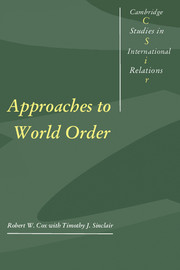Book contents
- Frontmatter
- Contents
- Preface
- Acknowledgements
- Part I Overviews
- 1 Beyond international relations theory: Robert W. Cox and approaches to world order
- 2 Influences and commitments
- Part II Theory
- Part III Interpretations
- Part IV Multilateralism
- Complete bibliography of works by Robert W. Cox to 1995
- Index of names
- Index of subjects
- CAMBRIDGE STUDIES IN INTERNATIONAL RELATIONS
1 - Beyond international relations theory: Robert W. Cox and approaches to world order
Published online by Cambridge University Press: 05 June 2012
- Frontmatter
- Contents
- Preface
- Acknowledgements
- Part I Overviews
- 1 Beyond international relations theory: Robert W. Cox and approaches to world order
- 2 Influences and commitments
- Part II Theory
- Part III Interpretations
- Part IV Multilateralism
- Complete bibliography of works by Robert W. Cox to 1995
- Index of names
- Index of subjects
- CAMBRIDGE STUDIES IN INTERNATIONAL RELATIONS
Summary
Robert W. Cox's work stands outside the usual parameters of international relations theory. Strongly historical in perspective, Cox's method of understanding global change represents a challenge to conventional ontological assumptions about international relations. These assumptions, the central of which is that states are the major actors whose interaction is to be explained, are qualified by Cox based on his observation that the major driving forces of world order change, albeit slowly, over time. Rather than discuss “the state,” Cox's focus has been on forms of state and how these change under pressure from forces from above (world order) and from below (civil society). Cox considers states to be focal terrains of conflict and institutional means of action internationally and nationally. In Cox's worldview the future represents an opportunity to break with the structures of the past and thus the potential to escape the strictures that bind human potential.
This essay is intended to provide the reader with an introduction to Robert W. Cox's approach to the study of international relations. It has four sections in which this is pursued. In the first part, the importance of Cox's work is established by reference to the changing nature of world order and the critical stance of his work. Unlike other approaches, it is argued, Cox's intellectual stance makes change a central feature of the understanding of international relations. This gives it an advantage over status quo perspectives in a world order characterized by transformation.
- Type
- Chapter
- Information
- Approaches to World Order , pp. 3 - 18Publisher: Cambridge University PressPrint publication year: 1996
- 3
- Cited by



